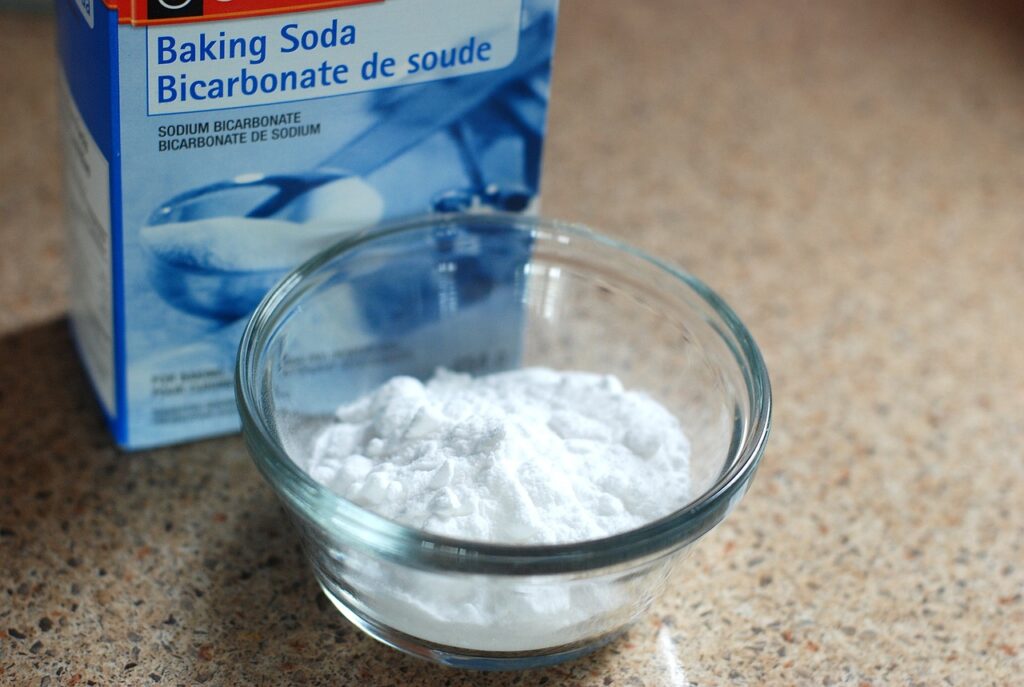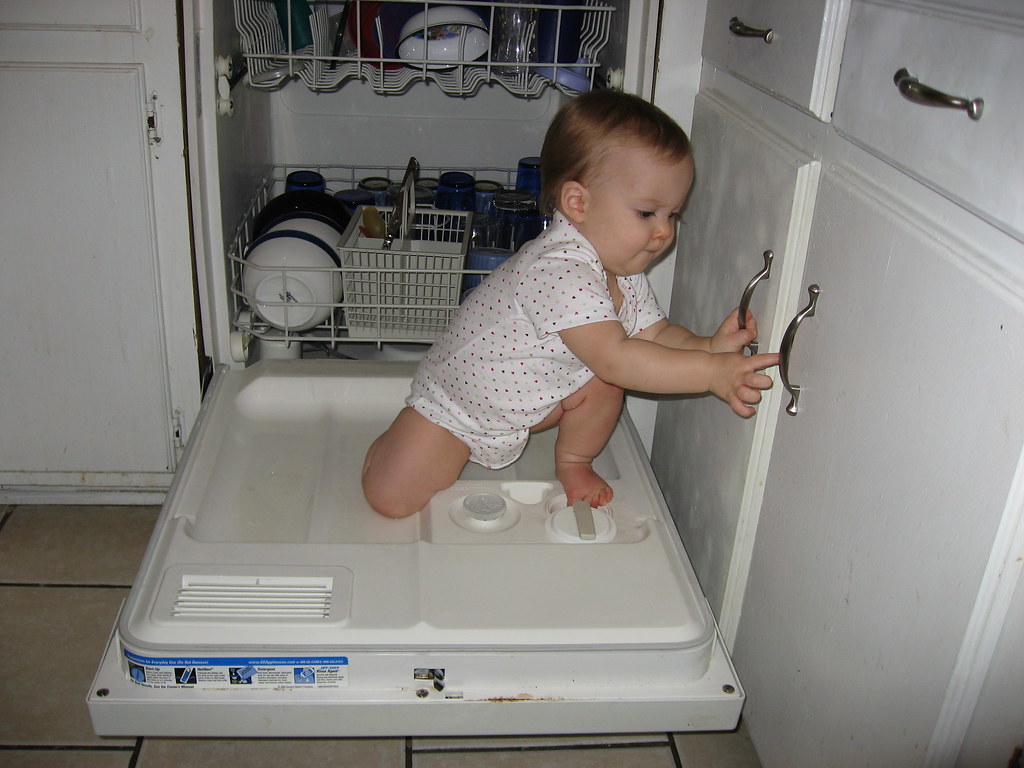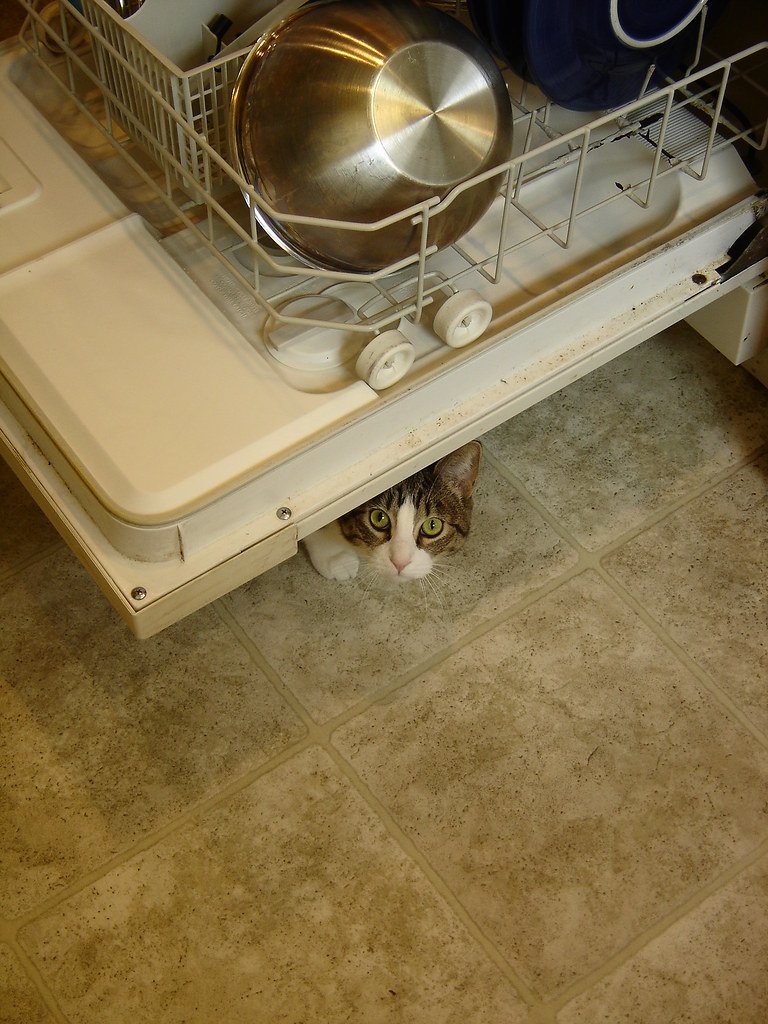Hey there, tired of pulling out supposedly clean dishes from your dishwasher only to find food residue and grime still lingering? It’s time for a deep clean to ensure your dishwasher is delivering hygienic washes every time. Let’s explore some top tips and tricks for giving your dishwasher a thorough scrub and reviving its cleaning power. After all, who doesn’t love the feeling of sparkling clean dishes straight from the dishwasher? Let’s get started and say goodbye to those pesky leftovers once and for all.
Table of Contents
- Unlocking the Secrets to Spotless Dishes with Vinegar Rinses
- Making Your Dishwasher Sparkle: The Magic of Baking Soda
- Harnessing the Power of Dishwasher-Specific Cleaning Agents
- The Ultimate Guide to Filter Maintenance Bliss
- Seal the Deal: Gasket and Door Seal Care
- Embrace the Shine: Stainless Steel Interior Deep Clean
- Mastering the Spinning Arms: Ensuring Unhindered Water Flow
- The Forgotten Corners: Tackling Hidden Grime
- The Lemon Freshness Boost for a Fragrant Finish
- Scheduled Splendor: Establishing a Regular Deep Clean Routine
- Questions & Answers for Dishwasher Deep Clean: Ensuring Hygienic Washes
- In Retrospect
Unlocking the Secrets to Spotless Dishes with Vinegar Rinses
When it comes to ensuring your dishes are truly spotless, vinegar rinses can be a game-changer. Not only are they effective in removing grease and food residues, but they also leave your dishes sparkling clean. Here’s how you can incorporate vinegar rinses into your dishwasher deep clean routine for hygienic washes every time:
Step 1: Preparing the Vinegar Rinse Solution
To create your vinegar rinse solution, simply mix equal parts of water and white vinegar in a bowl or measuring cup. For a standard dishwasher, you’ll need about 1-2 cups of the vinegar rinse solution. You can also add a few drops of essential oil, such as lemon or lavender, to give your dishes a pleasant fragrance.
Step 2: Running the Vinegar Rinse Cycle
Once the vinegar rinse solution is prepared, pour it into a dishwasher-safe container or simply place a cup of it on the top rack of your empty dishwasher. Then, run a hot water cycle with the vinegar rinse solution. The heat will help activate the cleaning properties of the vinegar, ensuring that your dishwasher and dishes are thoroughly sanitized.
Step 3: Enjoying Spotless Dishes
After the vinegar rinse cycle is complete, open up your dishwasher to reveal sparkling clean dishes and a fresh-smelling interior. Not only will the vinegar rinse help remove any lingering odors and build-up, but it will also leave your dishes free from spots and streaks.
Step 4: Repeat as Needed
To maintain the efficacy of your dishwasher deep clean routine, consider incorporating a vinegar rinse every 1-2 months. This will help prevent mineral build-up, keep your dishwasher in top condition, and ensure that your dishes come out spotless every time.
Incorporating vinegar rinses into your dishwasher deep clean routine is a simple and effective way to achieve hygienic washes and spotless dishes. By following these steps, you can unlock the secrets to consistently clean and sparkling tableware, all while using natural and affordable ingredients. So why not give it a try and experience the magic of vinegar rinses for yourself? Your dishes will thank you!
Making Your Dishwasher Sparkle: The Magic of Baking Soda

When it comes to dishwasher cleaning, baking soda is a powerhouse of a cleaning agent that can give your appliance a deep clean, ensuring hygienic washes for your dishes. Here’s how you can use baking soda to make your dishwasher sparkle:
Step 1: Clean the Interior
Start by removing any food particles and debris from the dishwasher’s interior. Then, sprinkle baking soda along the bottom of the dishwasher and run a hot water cycle to effectively clean and deodorize the appliance. The baking soda will help to remove any lingering odors and leave your dishwasher smelling fresh.
Step 2: Clean the Spray Arms
To ensure that your dishes are getting a thorough clean, it’s important to clean the dishwasher’s spray arms. Remove the spray arms and soak them in a solution of baking soda and water to remove any buildup and debris. Use a brush to scrub off any stubborn grime, then rinse and reattach the spray arms.
Step 3: Clean the Seal and Door Gasket
The rubber seal and door gasket of the dishwasher can often harbor mold and mildew. To clean these areas, create a paste using baking soda and water and use it to scrub the seal and gasket. This will help to remove any mold and mildew and prevent any unpleasant odors from developing.
Step 4: Clean the Filter
The dishwasher filter is responsible for trapping food particles and debris, but over time it can become clogged and dirty. Remove the filter and soak it in a solution of baking soda and water to dissolve any buildup. Use a brush to scrub away any remaining residue, then rinse and reinsert the filter.
By following these steps and using baking soda to deep clean your dishwasher, you can ensure that it continues to function at its best, providing hygienic washes for your dishes. So, next time you’re in need of a dishwasher deep clean, reach for the baking soda and see the magic for yourself!
Harnessing the Power of Dishwasher-Specific Cleaning Agents
When it comes to keeping your dishwasher in top condition, using dishwasher-specific cleaning agents is crucial. These powerful cleaners are designed to remove grease, limescale, and food residue from your dishwasher’s interior, ensuring hygienic washes every time. By harnessing the power of these specialized products, you can extend the lifespan of your dishwasher and improve its overall performance.
One popular dishwasher-specific cleaning agent is Finish Dual Action Dishwasher Cleaner. This convenient product not only cleans the interior of your dishwasher but also freshens it, leaving behind a pleasant scent. Another highly effective option is Lemi Shine Dishwasher Cleaner, which uses powerful citric extracts to tackle tough stains and buildup. These products are designed to be used on a regular basis, keeping your dishwasher in top condition with minimal effort.
When using dishwasher-specific cleaning agents, it’s important to follow the manufacturer’s instructions carefully. Typically, you’ll empty your dishwasher, place the cleaning agent in the detergent dispenser or a designated cleaning cycle, and run a hot water cycle. This will ensure that the cleaning agent can work its magic, breaking down residue and leaving your dishwasher sparkling clean.
| Pros | Cons |
|---|---|
| Effectively removes grease and limescale | May be more expensive than homemade alternatives |
| Freshens and deodorizes the dishwasher | May not be suitable for all dishwasher models |
| Convenient and easy to use | Should be used in a well-ventilated area |
| Helps extend the lifespan of the dishwasher |
The Ultimate Guide to Filter Maintenance Bliss
Dishwasher Deep Clean: Ensuring Hygienic Washes
Ensuring that your dishwasher is clean is crucial for maintaining hygienic washes and ensuring that your dishes come out sparkling every time. A deep clean of your dishwasher should be done regularly to prevent food particles and grime from building up and causing a foul odor and inefficient performance. Here are some step-by-step instructions for a thorough dishwasher deep clean:
Remove and Clean the Filter: Start by removing the filter from the bottom of the dishwasher. This is where food particles can accumulate and cause unpleasant odors. Rinse the filter under hot water to remove any debris and then use a brush to scrub away any stubborn residue.
Sanitize the Spray Arm: Take out the spray arm and soak it in a mixture of vinegar and water to remove any mineral deposits or debris that could be affecting its performance. After soaking, give it a good scrub and rinse thoroughly before putting it back in place.
Clean the Interior: Use a dishwasher-safe cleaning solution or a mixture of baking soda and water to clean the interior of the dishwasher. Pay close attention to the door gasket and edges where grime can build up.
Run a Cleaning Cycle: After all the components have been cleaned, run a cleaning cycle with a dishwasher cleaner or a mixture of vinegar and baking soda to eliminate any remaining odors and bacteria.
By following these steps for a thorough dishwasher deep clean, you can ensure that your dishwasher operates at its best, providing hygienic and efficient washes for your dishes.
Remember to perform this deep clean regularly to prevent any buildup and maintain the overall hygiene of your dishwasher. Your efforts will not only ensure clean dishes but will also extend the life of your appliance.
Seal the Deal: Gasket and Door Seal Care

Keeping your dishwasher clean is essential for ensuring that your dishes come out sparkling and hygienic after every wash. But did you know that maintaining the gasket and door seal is just as important for the overall cleanliness and efficiency of your dishwasher? Here’s a deep dive into gasket and door seal care, so you can seal the deal on a hygienic dishwasher every time.
The Importance of Gasket and Door Seal Care
The gasket and door seal are essential components of your dishwasher, helping to create a watertight seal to prevent leaks and ensure proper cleaning. Over time, these seals can collect food particles, soap scum, and grime, which can lead to mold and mildew growth. This not only affects the cleanliness of your dishes, but it can also impact the overall performance of your dishwasher. By taking the time to properly care for these seals, you can ensure that your dishwasher continues to run efficiently and hygienically.
Cleaning the Gasket and Door Seal
To keep your dishwasher’s gasket and door seal in top condition, follow these simple steps:
- Regularly wipe down the gasket and door seal with a mild detergent and warm water to remove any built-up grime.
- Check for any signs of wear or damage, such as tears or cracks, and replace the gasket if necessary to maintain a proper seal.
- After cleaning, ensure that the gasket and door seal are completely dry to prevent mold and mildew growth.
Tips for Maintenance and Prevention
In addition to regular cleaning, there are a few extra tips to help maintain the gasket and door seal of your dishwasher:
- Run a regular dishwasher cleaning cycle to help prevent buildup of grime and mold in hard-to-reach areas, including the gasket and door seal.
- Avoid using abrasive cleaners or harsh chemicals on the gasket and door seal, as these can cause damage and affect the seal’s effectiveness.
By following these simple steps and tips, you can ensure that the gasket and door seal of your dishwasher remain in top condition, allowing for hygienic washes every time. Proper care and maintenance of these essential components will not only prolong the life of your dishwasher, but also ensure that your dishes come out clean and germ-free after every wash.
Embrace the Shine: Stainless Steel Interior Deep Clean
When it comes to ensuring your dishwasher is delivering hygienic washes, a deep clean of the stainless steel interior is crucial. Over time, grime and residue can build up, leading to ineffective cleaning and potential bacterial growth. Here’s how to embrace the shine and keep your dishwasher in top condition.
First, start by removing the racks and utensil holders from the dishwasher. This will give you better access to the interior and make the cleaning process more thorough. Wipe down the interior walls and door with a solution of warm water and mild dish soap. For any stubborn stains or residue, use a paste made of baking soda and water, gently scrubbing the affected areas. Rinse thoroughly with water and dry with a clean, soft cloth.
Next, focus on the filter and spray arms. These components can easily become clogged with food particles and debris, impacting the dishwasher’s performance. Remove the filter and clean it under running water, making sure to remove all traces of dirt. Check the spray arms for any blockages, and use a toothpick or small brush to clear any obstructions.
After cleaning the interior and components, it’s important to give the exterior of the dishwasher some attention as well. Wipe down the door, controls, and handle with a stainless steel cleaner to maintain a polished look. Once everything is clean and dry, reassemble the racks and utensil holders. Your dishwasher is now ready to tackle the toughest cleaning tasks with ease.
Mastering the Spinning Arms: Ensuring Unhindered Water Flow

When it comes to dishwasher cleaning, ensuring that the spinning arms are free from blockages is crucial for an effective and hygienic wash. The spinning arms are responsible for distributing water throughout the dishwasher, so any obstruction can lead to inefficient cleaning and potential hygiene issues. Here are some tips to master the spinning arms and ensure unhindered water flow for a deep clean every time.
First, it’s important to inspect the spinning arms for any debris or mineral buildup. Remove the spinning arms and soak them in a mixture of warm water and vinegar to dissolve any limescale or mineral deposits. Use a brush to gently scrub away any remaining residue, ensuring that the nozzles are completely clear.
Next, check the water inlet and filter for any blockages. Clean the water inlet and filter by removing any debris or buildup that may be hindering water flow. A clogged water inlet can lead to insufficient water supply to the spinning arms, compromising the cleaning performance of the dishwasher.
To further optimize water flow, run an empty load with a dishwasher deep clean solution. Use a commercial dishwasher cleaner to remove any lingering grease, grime, and odors from the spinning arms and throughout the dishwasher interior. This will ensure that the water flow remains unimpeded and the dishwasher delivers hygienic washes every time.
By mastering the spinning arms and ensuring unhindered water flow, you can take the cleanliness of your dishes to the next level. A deep clean of the spinning arms will not only improve the efficiency of your dishwasher but also contribute to a more hygienic environment in your kitchen. Ensure that you perform regular maintenance and cleaning to uphold the optimal performance of your dishwasher.
The Forgotten Corners: Tackling Hidden Grime

When it comes to keeping your kitchen clean and hygienic, it’s essential to pay attention to every nook and cranny, including the often overlooked dishwasher. Even though it’s a machine designed to clean dishes, over time, your dishwasher can become a breeding ground for bacteria and grime if not properly maintained. To ensure your dishwasher is delivering hygienic washes, it’s important to give it a deep clean regularly.
Dishwasher Deep Clean: Ensuring Hygienic Washes
Regular cleaning of your dishwasher will not only keep it smelling fresh but will also prevent the build-up of food particles and grease, which can affect the cleanliness of your dishes. Follow these simple steps to give your dishwasher a deep clean and ensure it continues to provide hygienic washes:
- Remove and clean the filter: The filter in your dishwasher can trap food particles and debris, leading to unpleasant odors and reduced cleaning performance. Remove the filter and clean it with warm soapy water, then rinse and dry thoroughly before replacing.
- Scrub the spray arm: Food residues can clog the spray arm, affecting the water flow and cleaning efficiency. Remove the spray arm and scrub it with a brush and soapy water to remove any build-up.
- Wipe down the interior: Use a damp cloth and mild detergent to wipe down the interior of the dishwasher, including the door gasket and around the edges. Pay special attention to corners and crevices where grime can accumulate.
- Run a cleaning cycle: Once you’ve cleaned the key components of your dishwasher, run a cleaning cycle with a dishwasher cleaner or a mixture of vinegar and baking soda to eliminate any remaining odors and residue.
By following these simple steps, you can ensure that your dishwasher is delivering hygienic washes and prolong its lifespan. Remember to perform a deep clean of your dishwasher at least once a month to keep it running efficiently and maintain a clean and healthy kitchen environment.
The Lemon Freshness Boost for a Fragrant Finish

When it comes to ensuring hygienic washes in your dishwasher, incorporating a lemon freshness boost can make a significant difference in the overall cleanliness and fragrance of your dishes. Lemon is not only an effective natural cleanser, but it also leaves behind a refreshing scent that lingers long after the wash cycle is complete. Here’s how you can achieve a fragrant finish with a lemon freshness boost for a dishwasher deep clean.
First, gather the following supplies:
- 2 fresh lemons
- Bowl of warm water
- Microfiber cloth
Begin by cutting the lemons into halves and removing any visible seeds. Then, dip the cut side of the lemons into the warm water and use them to wipe down the interior of the dishwasher. Pay special attention to areas with build-up or stains, as the natural acidity of the lemons can help break down and dissolve any residue.
After wiping down the interior of the dishwasher with the lemons, allow the appliance to sit for 15-20 minutes to let the lemon juice effectively penetrate and cleanse. Once the time has elapsed, use a microfiber cloth to wipe away any remaining lemon residue, leaving behind a fresh and invigorating citrus scent. Run a quick rinse cycle to ensure that the lemon juice is completely removed.
Not only does this method provide a fragrant finish, but it also helps to eliminate bacteria and odor-causing germs, resulting in a hygienic dishwasher deep clean that will leave your dishes sparkling and smelling delightful.
Scheduled Splendor: Establishing a Regular Deep Clean Routine

Your dishwasher works hard to provide you with sparkling clean dishes, but it also needs some TLC to ensure it continues to run efficiently. Establishing a regular deep clean routine for your dishwasher is crucial for maintaining hygienic washes and extending the life of your appliance.
Step 1: Check the Filter
Start by removing the bottom rack of your dishwasher and locating the filter. This is where food particles and debris can accumulate, leading to odors and poor wash performance. Carefully remove the filter and clean it thoroughly with warm, soapy water. Make sure to remove any stubborn residue and give it a good rinse before replacing it.
Step 2: Run a Vinegar Wash
For a deep clean, place a cup of white vinegar on the top rack of your dishwasher and run a hot wash cycle. Vinegar is a natural disinfectant and will help to remove any lingering odors and kill bacteria in the dishwasher.
Step 3: Clean the Spray Arms
The spray arms are responsible for distributing water throughout the dishwasher, so it’s important to keep them clean. Check for any clogs or blockages and use a small brush or toothpick to remove any debris. You can also soak the spray arms in a vinegar and water solution to ensure they are thoroughly cleaned.
Step 4: Wipe Down the Interior
Finally, take a damp cloth and wipe down the interior of the dishwasher, paying special attention to the door seal and edges. This will remove any remaining food particles and help to prevent mold and mildew growth.
By establishing a regular deep clean routine for your dishwasher, you can ensure that it continues to provide hygienic washes for your dishes and operates at peak performance.
Questions & Answers for Dishwasher Deep Clean: Ensuring Hygienic Washes
What is a dishwasher deep clean?
A dishwasher deep clean is a thorough cleaning process that removes built-up grease, food particles, and other residues from the interior of the dishwasher to ensure hygienic washes.
How often should I deep clean my dishwasher?
It is recommended to deep clean your dishwasher at least once a month to maintain optimal hygiene and performance.
What supplies do I need for a dishwasher deep clean?
You will need white vinegar, baking soda, a toothbrush or scrubbing brush, a microfiber cloth, and a dishwasher-safe cleaning agent.
Can I use bleach to deep clean my dishwasher?
It’s best to avoid using bleach as it can damage the internal components of the dishwasher. Instead, opt for milder cleaning agents such as white vinegar or baking soda.
How do I clean the filter in my dishwasher?
Remove the filter from the dishwasher and use a toothbrush or scrubbing brush to gently scrub away any debris. Rinse the filter thoroughly with warm water before reinserting it into the dishwasher.
Should I clean the spray arms of my dishwasher during a deep clean?
Yes, it is important to clean the spray arms to ensure that water can flow freely through them, resulting in a more effective wash cycle.
Can I use commercial dishwasher cleaners for a deep clean?
Yes, there are commercial dishwasher cleaners available that are specifically designed for deep cleaning. Just make sure to read the labels to ensure they are safe for your specific dishwasher model.
How long does it take to deep clean a dishwasher?
The deep cleaning process typically takes about 30-60 minutes, depending on the level of build-up and the thoroughness of the cleaning.
Will a deep clean improve the performance of my dishwasher?
Yes, a deep clean can help improve the performance of your dishwasher by removing blockages, reducing odors, and ensuring that dishes come out cleaner and more hygienic.
What are the benefits of deep cleaning my dishwasher regularly?
Regular deep cleaning of your dishwasher can help maintain its lifespan, reduce the risk of bacterial growth, and ensure that your dishes are always washed hygienically.
In Retrospect
Thanks for diving into the world of dishwasher deep cleaning with us! We hope you’ve gained some valuable insights on how to keep your dishwasher in top-notch shape for hygienic and spotless washes. With just a little bit of regular maintenance, your trusty appliance can continue to dazzle you with its sparkling results. So go ahead, give your dishwasher some tender loving care, and enjoy the satisfaction of knowing that your dishes are getting the cleanest wash possible. Here’s to many more years of effortless cleaning and shining dishes! Cheers to a happy, sparkling dishwasher!
